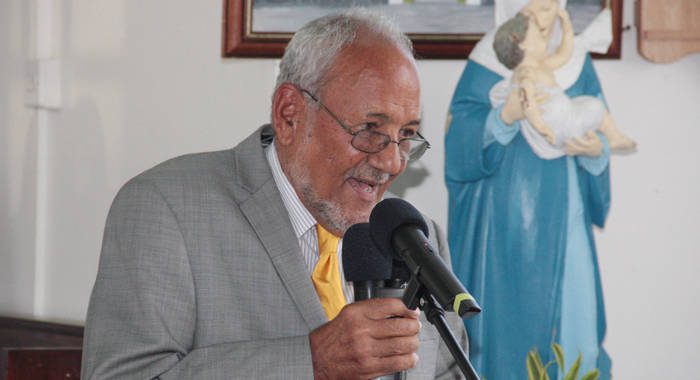Former Prime Minister Sir James Mitchell says he hopes that the London-based Privy Council not only rules in his favour but also awards cost in the matter in which he is claiming bias on the part of Commissioner of the Ottley Hall Commission of Inquiry, retired high court judge Ephraim Georges.
“All I want is that my name is cleared, and incidentally the name of St. Vincent cleared. It must not be said that St. Vincent had a corrupt prime minister name ‘Son’ Mitchell. And all of those who would like to throw my name into the dung heap of history, I think they will reach there before me,” he told IKTV on Friday.
The Privy Council will hear the matter in London today, Monday.
The Ottley Hall development project began in the 1990s when Sir James was prime minister and minister of finance under the New Democratic Party administration.
The project was a disaster and funds ran out with the development unfinished. It was later determined that the value of the work was lower than the amount of money that the government said it had spent on the project.
The Ralph Gonsalves Unity Labour Party, which came to office on March 28, 2001, set up a commission of inquiry in April 2003, and Governor-General Sir Frederick Ballantyne appointed Georges to lead an inquiry into the failure of the project.
Clause 13 of the terms of reference required Georges to immediately report anything that may show a criminal act, a bribe or fraudulent behaviour.
Georges produced an interim report pursuant to clause 13. The report included a number of adverse findings about Sir James.
Sir James was granted leave for judicial review in relation to the statements made in the report.
The judge held that a fair-minded observer would not conclude from the contents of the report that there was a real possibility of bias and the application was dismissed.
The Court of Appeal dismissed Sir James’ appeal and held that the test was whether Georges had closed his mind and demonstrated irreversible prejudgment and prejudice.
Sie James then appealed to the Privy Council
Speaking to IKTV on Friday, Sir James outlined his legal argument.
“My case before the Privy Council is this. … the Ottley Hall Commissioner, Mr George’s wrote a report, sent it to the Director of Public Prosecutions and the governor general and some of the media without ever seeing me or interviewing me.”
Sir James said that when the Inquiry started, the Commission wrote to him, asking whether he would share with the inquiry any information he had.
He said he responded, saying that he was willing to cooperate with the commission of inquiry, that all the documentation was at the Prime Minister’s Office, and if the commission wanted any information from him, to tell him what it wants and he would reply within two weeks.
“I am claiming three points: apparent bias, which would appear to the ordinary citizen if you pass judgement on that person without hearing them, without seeing them; bias in terms of the language in the report — you can’t just excuse yourself and say this is the comment of somebody else. The moment you put it in writing, it is your submission; and then improperly judicial proceedings,” Sir James said.
He did not comment on the implication of the Privy Council decision on the inquiry, which has been shelved since 2007, pending the outcome of the case before the Privy Council.
“I am not prepared to engage in prophecy. I leave that to resolve itself,” Sir James said, adding that he only want to clear his name and that of St. Vincent and the Grenadines.
“And let me say, it has cost me a little bit more than half a million US dollars. I have had to sell land, borrow money on lands and deposits etc. to get to this stage,” he said.
“I hope I will succeed and also get cost. If you get cost awarded by the Privy Council, it cannot be ignored, in the way other costs are ignored in the courts in the eastern Caribbean,’ Sir James said.
The Privy Council will rule on:
- What is the appropriate test for apparent bias in the circumstances?
- Was the test applied by the Court of Appeal, namely that the appellant had to prove that the respondent had closed his mind, correct?
- Is apparent bias demonstrated by the respondent in the Report, or otherwise in the circumstances of the case?
- Is the respondent disqualified from further conducting the Commission of Inquiry?
- Was the Report procedurally unfair, because it was produced outside the respondent’s terms of reference (Clause 13), or otherwise in breach of the rules of natural justice?






